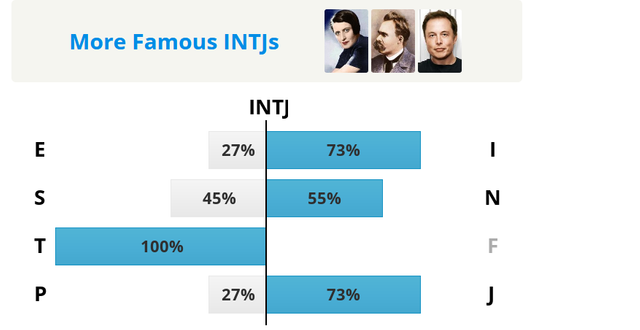first of all you need to use good tests for measuring dichotomies - use this http://similarminds.com/embj.html
or that https://www.idrlabs.com/test.php
to measure, they give very simmilar results in contrast to 16types test (i even scored istj there which is nonsense in my case).
you need do do comparison of cognitive functions by yourself,
you may be in so-called Ni-Fi loop (intj stres state) that produce results simmilar to high Ti (more less logic function) or even you can be INFJ on loop (Ni-Ti stress state)
you may naturally have higher Ti than most INTJ's
your natural cycle may influence results you give in tests etc, you may be hybrid of two types (some believe i am one becouse my function stack goest like Te>Ni>Ti>Fi>Se>Si>Fe* ->need to elaborate on that later ) or you can have some brain issues (that happens somethimes so its worth considering to do brain scans )
No i znowu, w pierwszym teście mi wyszło INTP
( Introverted (I) 78.57% Extroverted (E) 21.43%
Intuitive (N) 53.57% Sensing (S) 46.43%
Thinking (T) 77.14% Feeling (F) 22.86%
Perceiving (P) 53.33% Judging (J) 46.67%)
A w drugim INTJ. I to aż 73% w stronę J. Bez sensu. Ale mam wrażenie że w tym drugim teście (https://www.idrlabs.com/test.php) pytania były dużo lepiej sformułowane i wiedziałam w końcu, czego dotyczą.
różnica między Ni a Ne jest taka że Ni buduje jakby swój koncept wokół jednej zasady, robi schematy ze schematów, jest to funkcja "przewidywania przyszłości", Ne jest funkcją można powiedzieć post modernistów - funkcja możliwości, równości możliwości, preferencji wielu możliwości, Fi - wewnętrzne zasady i emocje, Ti- postępowanie logiczne, myślenie logiczne, Fe- jakby zasady grupy ponad własne, coś takiego. Te to funkcja używania obiektywnych danych (możliwe że ich wykonywanie również zadań, zarządzanie)
http://similarminds.com/embj.html
or that
https://www.idrlabs.com/test.php
to measure, they give very simmilar results in contrast to 16types test (i even scored istj there which is nonsense in my case).
Zawsze w 16personalities wychodziło mi bardzo duże przesunięcie w stronę T, a J/P były 50/50.
No i znowu, w pierwszym teście mi wyszło INTP
( Introverted (I) 78.57% Extroverted (E) 21.43%
Intuitive (N) 53.57% Sensing (S) 46.43%
Thinking (T) 77.14% Feeling (F) 22.86%
Perceiving (P) 53.33% Judging (J) 46.67%)
A w drugim INTJ. I to aż 73% w stronę J. Bez sensu. Ale mam wrażenie że w tym drugim teście (https://www.idrlabs.com/test.php) pytania były dużo lepiej sformułowane i wiedziałam w końcu, czego dotyczą.
różnica między Ni a Ne jest taka że Ni buduje jakby swój koncept wokół jednej zasady, robi schematy ze schematów, jest to funkcja "przewidywania przyszłości", Ne jest funkcją można powiedzieć post modernistów - funkcja możliwości, równości możliwości, preferencji wielu możliwości, Fi - wewnętrzne zasady i emocje, Ti- postępowanie logiczne, myślenie logiczne, Fe- jakby zasady grupy ponad własne, coś takiego. Te to funkcja używania obiektywnych danych (możliwe że ich wykonywanie również zadań, zarządzanie)